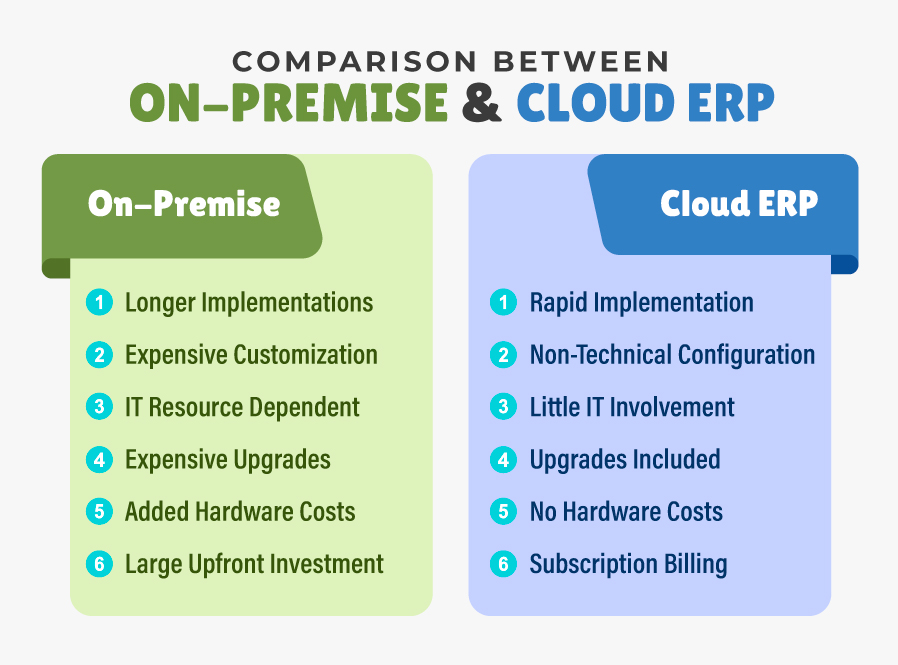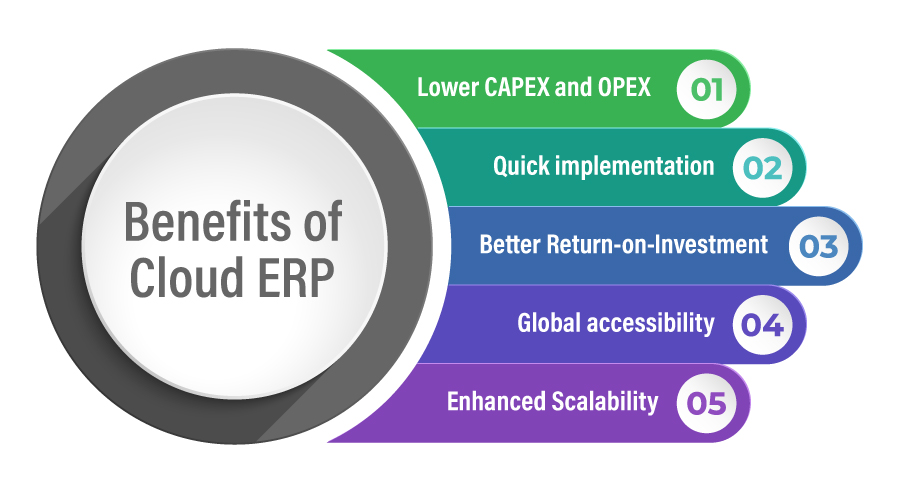
- Overview
- What is Cloud ERP?
- Types of Cloud ERP
- Cloud ERP for SMEs in the UK
- Benefits of Cloud ERP
- Conclusion
A Company with fewer than 250 employees and a turnover of less than €50 million or a total balance sheet of less than €43 million, is considered as an SME (Small and medium-sized enterprise) in the United Kingdom (UK). With a collective turnover of €2791.6 billion and 13.6 million total employees, the SME business sector makes a remarkable contribution in the UK’s economy. Now that we have established “who” we are talking to, let’s focus on “what” we are talking about – Cloud ERP.
In their starting and growing years, manufacturers don’t have sufficient financial resources for an on-premise ERP system. However, the compulsion to constantly compete with bigger companies fuels their need for an ERP. Traditional ERPs tend to have high CAPEX (Capital Expenditure) and OPEX (Operational Expenditure), which makes them out-of-reach for SMEs in the UK. In such a situation, cloud ERP emerges as the logical and reasonable alternative, due to its lower price and negligible maintenance costs.
What is Cloud ERP?
Cloud ERP is an enterprise resource planning software that can be run over the internet through a vendor’s cloud platform. Instead of installing a heavy-duty software on-premise, anyone with valid credentials can access cloud ERP on a web browser connected to the internet. Users can access and operate all ERP modules over the web, including planning, procurement, inventory, manufacturing, compliance, finance, sales & marketing, etc.
Cloud ERPs are categorized as SaaS (Software-as-a-Service). Clients subscribe to the ERP service and their data is stored on servers provided by the vendor, controlling the costs involved. The clients can buy monthly, quarterly or yearly subscription and the responsibility of application maintenance, feature upgrades, software innovations, data storage and information security, lies with the vendor.
On-premise ERPs have high CAPEX and OPEX because the cost of developing and maintaining the supporting IT infrastructure (servers, systems, hardware etc.) rests with the client. Therefore, cloud ERPs are better suited for SMEs than on-premise ERP.

Types of Cloud ERP
While discussing the types of cloud ERP software, it becomes clear that all of them offer many of the same benefits. However, the distinct differences in how they are set up can have a huge impact on your business in terms of security, finances and flexibility. The choice of selecting from the available alternatives depends on the financial commitment you are willing to make, your comfort with the data being on the cloud and who you want managing it. Listed below are the types of cloud ERP system:
- Multi-tenant SaaS – The same version of the ERP software and its connected infrastructure is used by multiple organizations. While each organization uses the same software and is being hosted on the same server, one company’s data remains inaccessible to the other companies.
- Single-tenant SaaS – A single version of the cloud ERP software is dedicated to a single client. No other company can use the same instance of the software and the data is also hosted on private servers. The cost of Single-tenant SaaS is higher than multi-tenant.
- Public Cloud – Owned by the vendor, multiple organizations use the same cloud computing services over a public cloud. While the accessibility may be over a public domain, data still remains quite secure. Examples of public cloud include Amazon Web Services, Google Cloud and Microsoft Azure.
- Private Cloud – A private cloud setup is created by purchasing a dedicated server space at a data centre. The services of a private cloud are not shared with any other organization.
- Hybrid ERP – A combination of on-premise ERP software with a private or public cloud for computing, storage and services.
Cloud ERP for SMEs in the UK
Despite having limited resources, start-ups and small businesses in the UK are expected to compete with big corporations directly, while maintaining the same quality standards. The need for operational efficiency and product standardization is not just a matter of profitability, but a matter of survival for most of these SMEs. Such companies can now implement a low-cost cloud ERP and receive a complete bouquet of ERP modules, functions and capabilities.
The growing SME sectors of pharmaceutical, food and garment manufacturing can benefit greatly from an ERP implementation. A cloud-based ERP system can help reduce their working capital and inventory carrying cost, thus releasing funds to invest in business development. Industry standard practices embedded in the ERP can help SMEs redesign their workflows to match with large enterprises. Therefore, they can vicariously achieve the same level of organizational efficiency without increasing their staff.
Why Cloud ERP software for UK SMEs?
Enhanced business visibility, increased efficiency, real-time reporting, improved departmental collaboration, built-in compliance, better customer service and environmental flexibility are the major benefits derived from an ERP software. On top of all these benefits, cloud ERP has benefits of its own. The specific benefits of cloud ERP are listed below:

- Lower CAPEX and OPEX – The initial investments required for traditional ERPs are incredibly excessive for SMEs. Therefore, small businesses should implement cloud ERP to obtain the same software package for a lower cost by paying a recurrent feasible subscription fees to the vendor. A much smaller investment doesn’t disrupt the cash flow towards primary business activities and doesn’t put unnecessary performance pressure on the business.
- Quick implementation – With cloud ERP, all the implementation infrastructure is already in place on the vendor’s end. The process of implementation can be started within a week or lesser and having built-in best practices means lesser time and effort spent on customization. As opposed to on-premise ERPs, cloud ERP doesn’t require the selection and setup of hardware or hiring and training of the IT staff, resulting in faster implementation.
- Global accessibility – Quite naturally, cloud-based ERP is location-agnostic. Companies embracing the work-from-anywhere culture induced by COVID-19 can benefit immensely from this mode of ERP implementation. With anytime anywhere access, processes halts, approvals, disruptions can be handled immediately, curtailing the damage caused by delays or unavailability of information . Companies with a global presence can use the same ERP software for all their locations, hence integrating their entire business, processes and people. Bringing about collaboration, co-hesion and conformance for better performance.
- Better Return-on-Investment – The total cost of ownership for cloud ERP is much lower than that of on-premise ERP. Plus, the time taken to start receiving the benefits of cloud based ERP is also lesser. Therefore, it is easier and faster for companies to achieve the ROI associated with cloud ERP. Additionally, the client isn’t required to spend extra on software upgrades and version updates, which lets them use the latest ERP software without any extra cost.
- Enhanced Scalability – Without needing to add more servers for more users or locations or subsidiaries, cloud ERP can make scalability very easy. An organization can start with the basic, core functionality and add more as needed—without adding more hardware. Cloud vendors typically own data centres across the globe and will keep each customer’s data in multiple locations, providing better and more reliable service.
Conclusion
Along with these major benefits, cloud-based ERP system also offers increased organizational agility, greater data security, enhanced compliance and data recovery. So, if you are an SME business owner in the UK, you should definitely consider getting a cloud ERP system for your manufacturing operations. BatchMaster ERP is one of the top ERP providers across the UK and Europe with industry-specific solutions for all the major SME sectors in the UK. If you would like a demo, click here.






